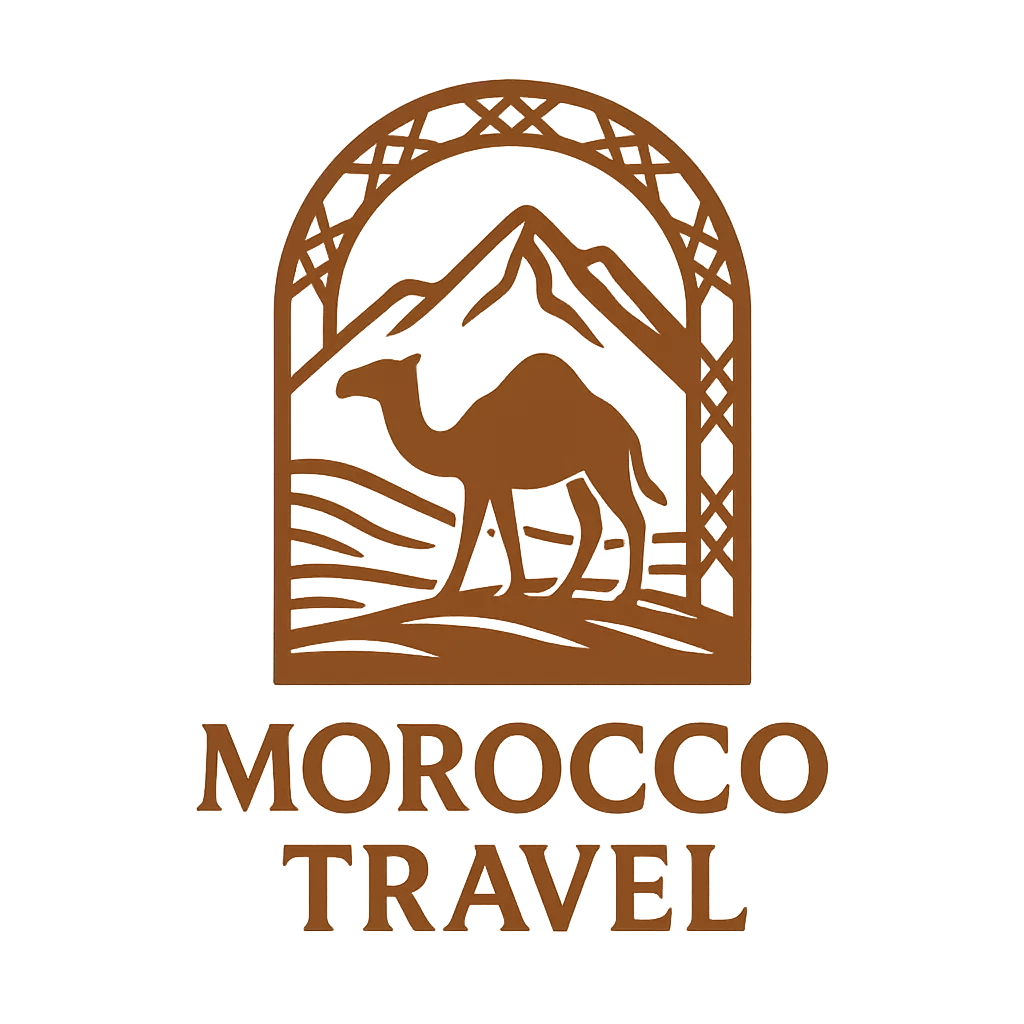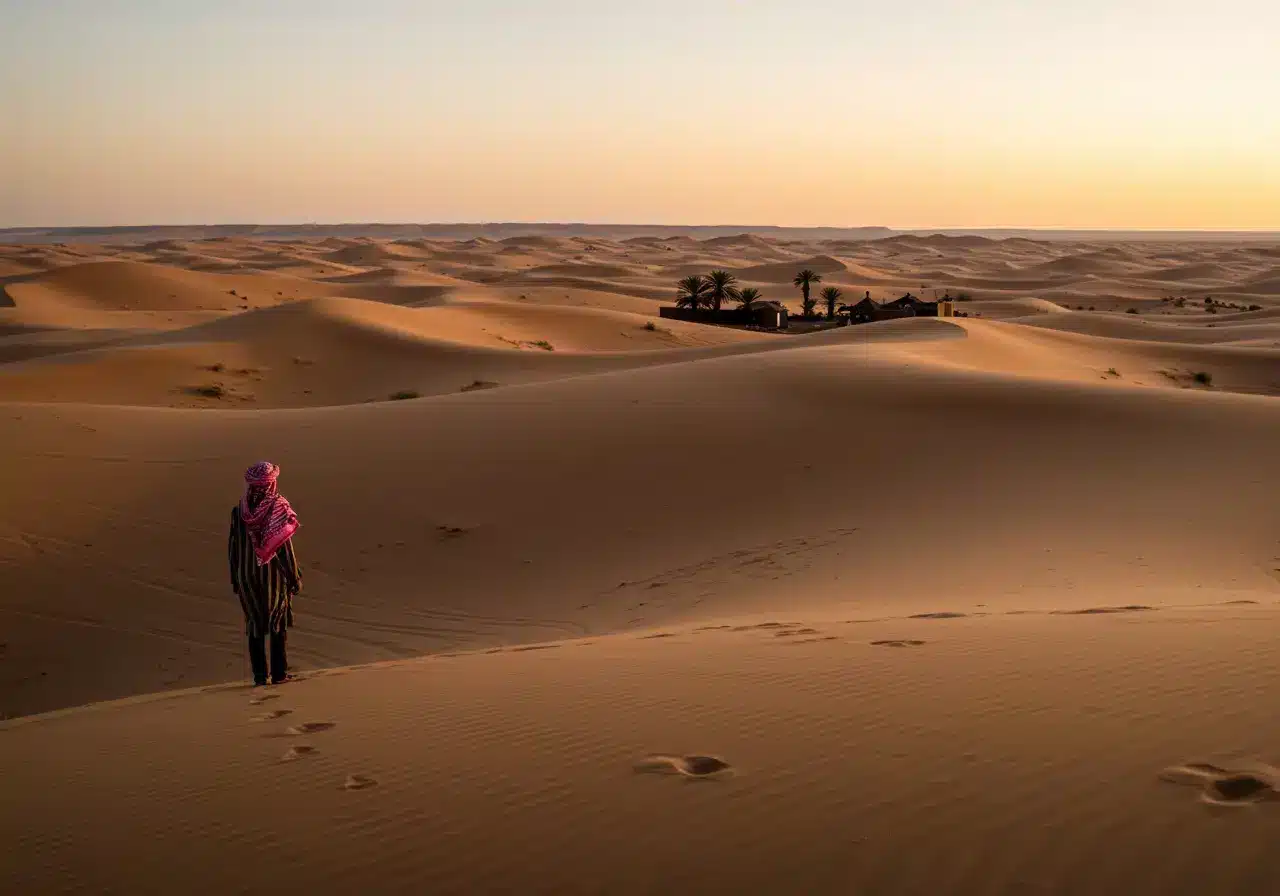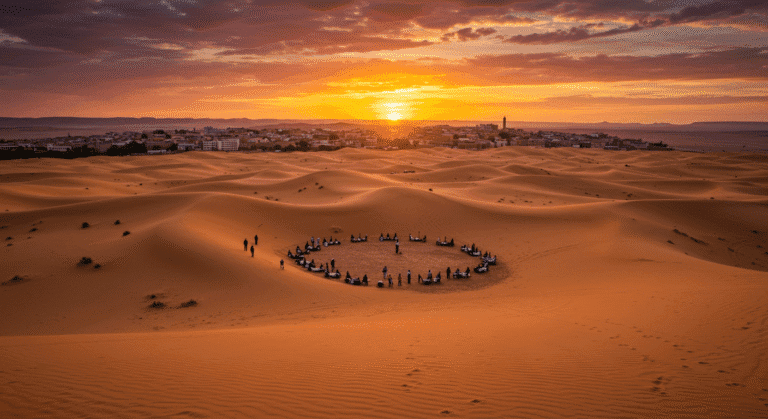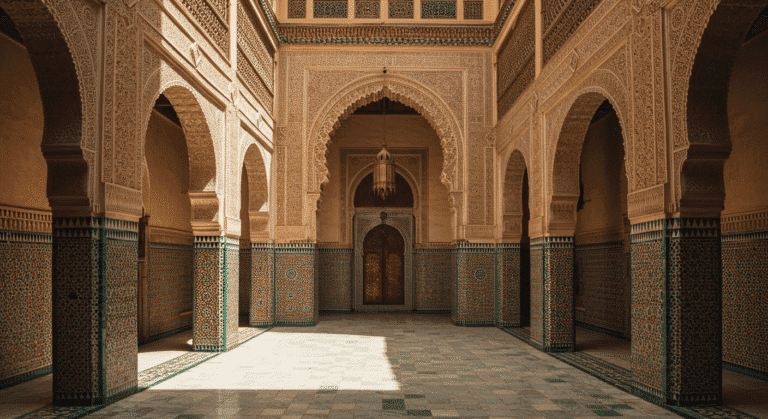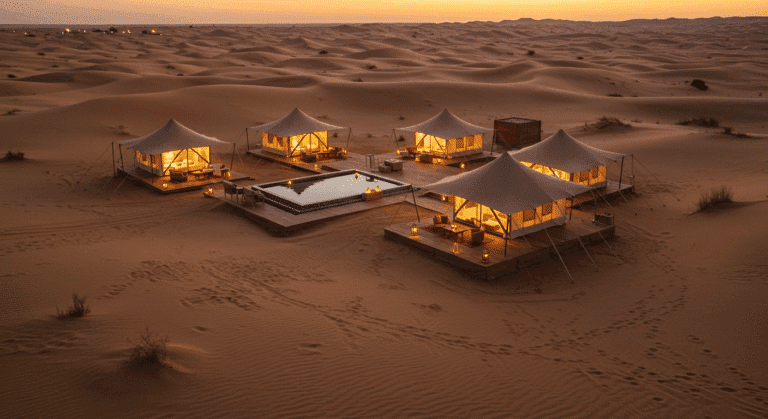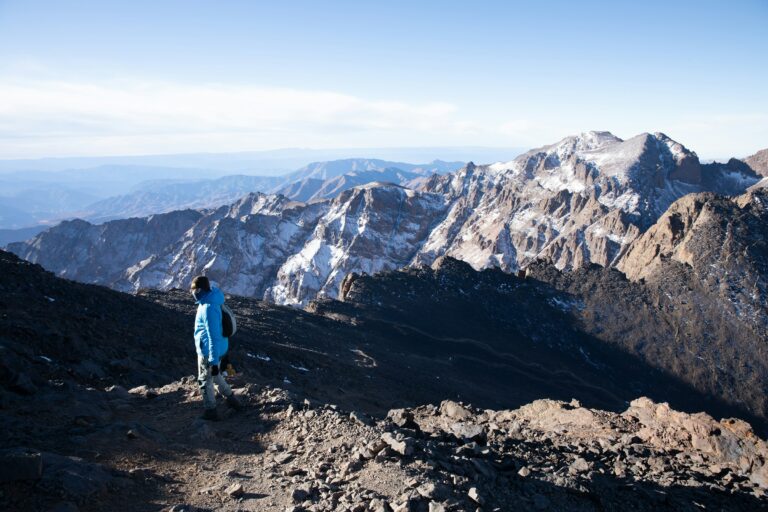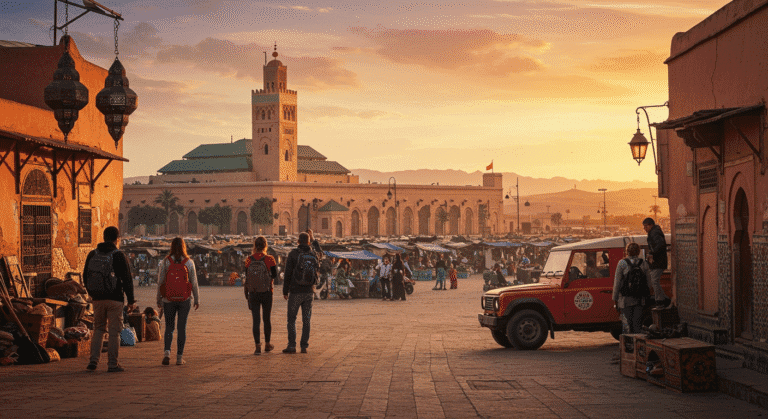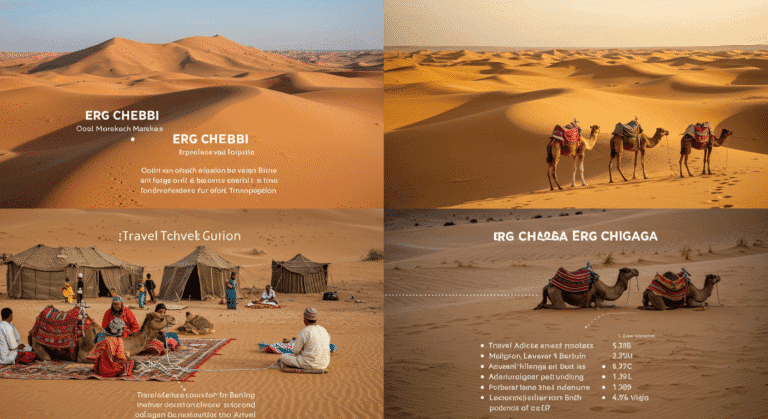Explore Merzouga: Where the Sand Meets the Sky
Is Merzouga’s Desert Experience Worth Traveling to the Edge of the Sahara?
Have you ever wondered what it feels like to stand at the precipice of one of Earth’s most iconic deserts, where endless waves of golden sand stretch toward the horizon? Merzouga, a small Moroccan village nestled against the legendary Erg Chebbi dunes, offers precisely this transcendent experience. Unlike more commercialized desert destinations, Merzouga provides an authentic gateway to the Sahara that many travelers overlook in favor of larger Moroccan cities. The question isn’t whether you should visit Merzouga, but rather: why haven’t you planned your Merzouga adventure yet?
As the sun casts its first light over the magnificent sand dunes of Merzouga, the landscape transforms into a mesmerizing palette of orange, gold, and amber. This remote desert outpost in southeastern Morocco serves as the perfect base for experiencing the raw beauty of the Sahara Desert, where traditional Berber culture thrives alongside spectacular natural wonders.
What to Pack for Your Merzouga Adventure
Preparing for Merzouga’s unique desert environment requires thoughtful packing. The dramatic temperature fluctuations and specific activities demand particular attention to your travel essentials:
Clothing:
- Lightweight, breathable clothing for scorching daytime temperatures
- Warm layers for surprisingly cold desert nights (temperatures can drop below 40°F/5°C in winter)
- Sturdy walking shoes for dune exploration
- Desert boots or closed shoes (sand can reach scorching temperatures)
- Scarves or shemagh (traditional head covering) for protection against sun and occasional sandstorms
- Sunglasses with UV protection (desert glare is intense)
- Modest clothing that covers shoulders and knees (respectful of local customs)
Essential Gear:
- High SPF sunscreen (minimum SPF 50)
- Lip balm with sun protection
- Portable power bank (electricity can be inconsistent in desert camps)
- Headlamp or flashlight for nighttime navigation
- Compact binoculars for stargazing and wildlife spotting
- Microfiber towel (quick-drying and lightweight)
- Reusable water bottle (minimum 1L capacity)
Pro Tips:
- Pack a small dry bag to protect electronics from fine sand particles
- Bring wet wipes as shower facilities are limited in desert camps
- Include basic medications and a compact first aid kit
- Consider bringing a lightweight, breathable sleep sack for overnight desert stays
- Camera dust protection is essential (sealable bags and lens cleaning equipment)
Best Time to Visit Merzouga
Choosing the optimal time to visit Merzouga can dramatically enhance your desert experience:
October to April (Peak Season):
This period offers the most pleasant weather conditions with daytime temperatures ranging from 68°F to 86°F (20°C to 30°C). According to local tourism data, October and November see 40% fewer visitors than the spring months while offering similarly comfortable temperatures. December through February provides the coolest temperatures, perfect for extended desert trekking, though nights can drop to near freezing.
Spring (March to May):
Spring brings mild temperatures and occasional wildflower blooms along the desert fringe. March and April experience only half the rainfall of winter months while maintaining comfortable temperatures. The Festival of Desert Music typically occurs in late March, adding cultural richness to your visit.
Summer (June to September):
Summer temperatures regularly exceed 104°F (40°C), making extensive outdoor activities challenging. However, hotel rates drop by approximately 35% compared to peak season, and you’ll encounter 60% fewer tourists. Early morning and evening activities become essential during these months.
Data-Driven Insight:
Booking accommodations 2-3 months in advance for November visits can save you approximately 25% compared to last-minute bookings, while still enjoying optimal weather conditions.
Step-by-Step Merzouga Itinerary
Day 1: Arrival and Desert Introduction
Begin your journey by arriving in Merzouga, ideally before mid-afternoon. Most travelers reach this desert gateway via Errachidia Airport (about 2 hours away) or by private transfer from larger cities like Fes (7-8 hours) or Marrakech (9-10 hours).
Check into your chosen accommodation options range from authentic desert kasbahs to luxury desert-edge hotels. The Kasbah Mohayut and Riad Madu offer excellent mid-range options with traditional architecture and modern amenities.
As the afternoon heat subsides, take a leisurely stroll to the edge of the Erg Chebbi dunes for your first glimpse of the Sahara’s vastness. The golden hour before sunset transforms the landscape into a photographer’s paradise, with dunes casting long, dramatic shadows.
For dinner, enjoy your first taste of authentic Moroccan cuisine at a local restaurant like Café Restaurant Nora, where traditional tajines are prepared with locally sourced ingredients. End your day with mint tea on a rooftop terrace, gazing at stars unfettered by light pollution.
Day 2: Desert Immersion and Cultural Encounters
Start early with a light breakfast before embarking on a half-day desert excursion. A 4×4 vehicle will take you deeper into the Erg Chebbi dunes, stopping at key viewpoints and hidden oases. Along the way, visit Khamlia village, home to the Gnawa people known for their distinctive music rooted in ancient African traditions.
Participate in a traditional music performance, where rhythmic clapping, metal castanets, and bass drums create hypnotic melodies that have remained unchanged for centuries. This authentic cultural experience offers insight into desert life beyond tourist attractions.
Return to Merzouga for lunch and a brief siesta during the hottest hours. In the late afternoon, experience a traditional Berber tea ceremony with a local family, learning about desert hospitality customs and the significance of the three ritual servings of tea.
As sunset approaches, embark on a guided camel trek into the dunes. The gentle sway of camel transportation has remained unchanged for centuries, offering a timeless desert experience. Reach a strategic dune viewpoint to witness the spectacular sunset, where the changing light creates a kaleidoscope of colors across the rippled sand surface.
Overnight at an authentic desert camp nestled between towering dunes. Enjoy dinner under the stars, followed by traditional music around a campfire. The silence of the desert night, broken only by distant drums and the whisper of shifting sands, creates an unforgettable sensory experience.
Day 3: Desert Adventures and Natural Wonders
Wake before dawn to climb a nearby dune and witness the magical desert sunrise. The first rays illuminating the endless sea of sand create a photographer’s dream landscape with ever-changing shadows and colors.
After breakfast at camp, return to Merzouga via camel or 4×4 (your choice). Spend the late morning visiting the seasonal salt lake of Dayet Srji, located just outside town. This unexpected desert oasis attracts flamingos, storks, and desert warblers between March and November, offering surprising biodiversity in this arid environment.
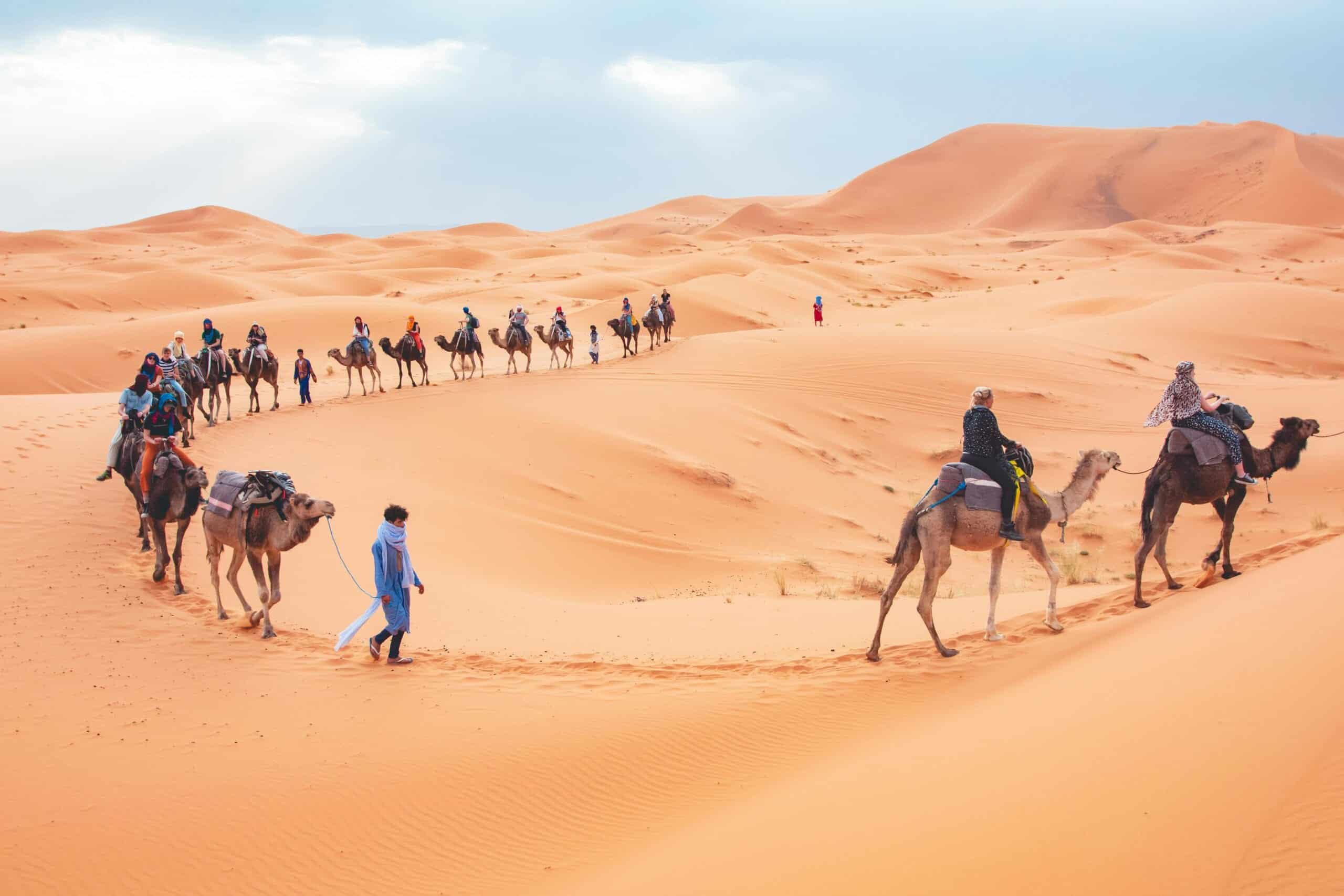
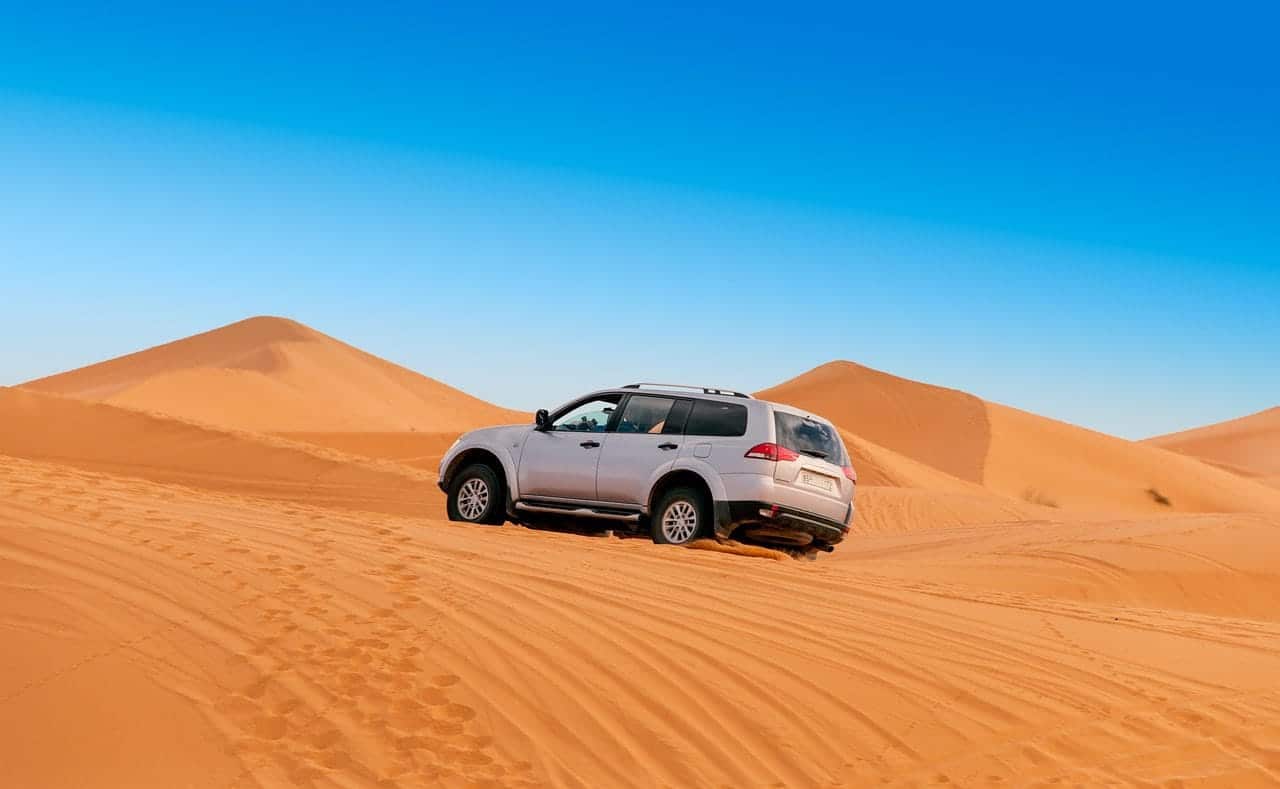
For lunch, try a cooking class at La Maison Marocaine, where you’ll prepare traditional Berber pizza (medfouna) using ancient techniques and local ingredients. This hands-on cultural experience provides culinary skills you can take home.
In the afternoon, experience desert sports with a guided sandboarding session on the smaller dunes near town. The smooth, steep slopes provide natural slides for this exhilarating activity that requires no previous experience.
As evening approaches, embark on a sunset quad bike excursion (for the adventurous) or a more serene sunset walk to photograph the changing colors of the desert. End your day with dinner at a local restaurant featuring traditional live music.
Day 4: Desert Outskirts and Departure
On your final morning, explore the desert’s edge ecosystem with a guided nature walk focusing on desert adaptation and survival. Learn about the remarkable plants and animals that thrive in this extreme environment through specialized evolutionary adaptations.
Visit local artisans in Merzouga village who create traditional crafts, including woven carpets and metalwork. These authentic souvenirs support local economies while providing meaningful mementos of your journey.
For travelers with afternoon departures, enjoy a final Moroccan lunch before beginning your onward journey. Those with evening departures might consider a late afternoon visit to the fossil workshops in nearby Erfoud, where skilled craftsmen transform 350-million-year-old marine fossils into decorative pieces.
Budget Breakdown for Merzouga
Understanding the cost structure of a Merzouga trip helps prepare financially for this desert adventure:
Transportation:
- Budget: Shared taxi from Errachidia to Merzouga: 70-100 MAD ($7-10)
- Mid-range: Private transfer from Errachidia Airport: 600-800 MAD ($60-80)
- Luxury: Private 4×4 from Marrakech with scenic stops: 3,000-4,000 MAD ($300-400)
Accommodation (per night):
- Budget: Basic hotel or hostel: 150-300 MAD ($15-30)
- Mid-range: Comfortable desert kasbah: 500-800 MAD ($50-80)
- Luxury: Premium desert camp or boutique riad: 1,200-2,500 MAD ($120-250)
Food (per day):
- Budget: Street food and local cafes: 100-150 MAD ($10-15)
- Mid-range: Restaurant meals: 200-350 MAD ($20-35)
- Luxury: Fine dining experiences: 400-700 MAD ($40-70)
Activities:
- Basic camel trek with sunset: 200-300 MAD ($20-30)
- Overnight desert camp experience: 400-800 MAD ($40-80)
- Private 4×4 desert excursion (half-day): 600-800 MAD ($60-80)
- Quad biking (per hour): 300-400 MAD ($30-40)
- Cooking class: 250-350 MAD ($25-35)
Money-Saving Tips:
- Visit during shoulder season (October or April) for 20-30% lower accommodation rates
- Negotiate prices for activities when booking multiple experiences
- Combine transportation with other travelers to share private transfer costs
- Bring a water filter to avoid purchasing bottled water
- Book desert camps directly rather than through hotels (savings of 150-300 MAD)
Sustainable and Alternative Experiences in Merzouga
While the classic desert experience remains popular, consider these sustainable and alternative approaches to enrich your Merzouga journey:
Eco-Friendly Desert Exploration:
Partner with environmentally conscious operators like Sahara Eco Tours, which employs local guides, uses renewable energy at their camps, and participates in dune preservation initiatives. Their solar-powered desert camps reduce environmental impact while providing an authentic experience.
Cultural Immersion Programs:
Several local families offer homestay experiences where visitors can participate in daily activities like bread baking, textile weaving, and traditional medicine preparation. These intimate cultural exchanges provide deeper understanding than conventional tours while financially supporting local communities directly.
Desert Conservation Activities:
Join a half-day conservation program with the Desert Ecosystem Preservation Association, where you’ll learn about desert ecology while participating in native plant restoration projects. This hands-on experience connects travelers with environmental stewardship efforts.
Alternative Traveler Options:
- Families: Kid-friendly desert camps offer camel rides with specially designed saddles for children and storytelling sessions featuring Berber folklore.
- Solo travelers: Community-based guesthouses facilitate connections with fellow travelers and locals through shared meals and cultural exchanges.
- Digital nomads: Several accommodations now offer reliable Wi-Fi and dedicated workspaces with desert views, allowing for productive remote work balanced with desert exploration.
- Wellness seekers: Experience traditional sand therapy (hot sand treatments) and desert meditation retreats that leverage the Sahara’s natural tranquility.
Food & Dining Suggestions in Merzouga
Merzouga’s culinary landscape blends Berber traditions with broader Moroccan influences, creating distinctive desert gastronomy:
Must-Try Local Specialties:
- Medfouna (Berber pizza): A stuffed bread traditionally filled with spiced meat, onions, and herbs, then baked in hot sand experience this at Restaurant Cafe Fatima where they maintain traditional cooking methods.
- Desert truffles: Seasonal delicacy (February-April) harvested from the desert and prepared in tajines or scrambled with eggs at Café Restaurant La Caravane.
- Harcha: Semolina bread often served with honey and argan oil for breakfast, best sampled at morning markets or local homes.
- Berber tajine: Slower-cooked than its northern counterparts, often featuring desert herbs like wild thyme and sage try the lamb version at Restaurant Kasbah Mohayut.
Dining Experiences:
Enjoy a sunset dinner at Haven La Chance Desert Hotel’s rooftop restaurant, where the panoramic dune views complement traditional tajines seasoned with local herbs. Pair your meal with Moroccan Tea (surprisingly excellent) while watching colors transform across the desert landscape.
For an authentic local experience, visit the family-run Café Nora, where three generations prepare hand-rolled couscous every Friday using techniques passed down through centuries. Their mint tea ceremony, performed tableside, demonstrates the rhythmic pouring technique that aerates the tea perfectly.
Insider Tip:
Request the special “desert bread” at local bakeries it’s made with slightly more salt to preserve freshness in the arid climate and has a distinctive texture that complements local olive oils.
Common Mistakes to Avoid in Merzouga
Even experienced travelers can encounter pitfalls in this unique desert environment:
Timing Errors:
Many visitors underestimate transportation times, particularly from major cities. The journey from Marrakech typically takes 9-10 hours, not the 6-7 hours sometimes advertised. Schedule arrival by early afternoon to avoid navigating unfamiliar desert roads after dark.
Cultural Missteps:
Photographing local people without permission is considered disrespectful. Always ask before taking photos, particularly of Berber women. When permission is granted, offer a small token of appreciation (not necessarily money).
Booking Pitfalls:
Avoid booking desert camps solely based on online ratings. Many authentic, family-run operations have limited internet presence despite offering superior experiences. Ask your accommodation for trusted recommendations or book through established local agencies like Sahara Morocco Tours.
Preparation Oversights:
Many travelers bring insufficient water for desert excursions. The recommended minimum is 2 liters per person for a half-day outing, even outside summer months. Dehydration occurs rapidly in low-humidity environments, often before thirst registers.
Navigation Challenges:
The dunes around Merzouga look deceptively similar, making independent exploration risky for inexperienced desert travelers. Even short walks can become disorienting when the wind shifts sand and erases footprints. Always use a guide for dune excursions beyond the immediate vicinity of camps.
Safety & Travel Tips for Merzouga
Health Considerations:
- The desert sun is exceptionally intense reapply sunscreen (SPF 50+) every two hours, even on cloudy days
- Desert climate causes rapid dehydration; drink water consistently throughout the day
- Bring electrolyte packets to add to water, especially if experiencing symptoms of heat exhaustion
- Sand-related eye irritation is common; pack lubricating eye drops
- Local medical facilities are basic; comprehensive travel insurance with evacuation coverage is essential
Practical Information:
- Download offline maps of the region; cellular service is spotty beyond Merzouga village
- The local SIM card provider “Maroc Telecom” offers the most reliable desert coverage
- Most desert camps and some hotels operate on generator power with limited hours; charge devices whenever possible
- ATMs are scarce; withdraw sufficient cash in larger towns before arriving
- Currency exchange options are limited and rates unfavorable; exchange money in major cities
Cultural Awareness:
- Modest dress is appreciated, particularly covering shoulders and knees
- During Ramadan, respect fasting hours by avoiding eating in public during daylight
- Basic Arabic or French phrases are appreciated by locals; “shukran” (thank you) and “salam” (hello) go a long way
- Tipping is expected for services; 10-15% for guides and 5-10% in restaurants
Safety Precautions:
- Solo female travelers should exercise standard precautions; harassment is uncommon but not unheard of
- Desert temperatures drop dramatically after sunset; always carry an extra layer
- Flash floods can occur between November and February; avoid dry riverbeds during rain
- Police checkpoints are common on roads to Merzouga; keep passport accessible
Discover the Timeless Magic of Merzouga
Merzouga represents far more than a photogenic desert landscape it offers a portal to experience the Sahara’s timeless majesty and Berber cultural heritage. From the transcendent silence of massive dunes to the rhythmic tea ceremonies of local families, this desert frontier creates memories that resonate long after the sand is shaken from your shoes. Whether camping beneath the Milky Way or learning ancient survival techniques from desert nomads, Merzouga connects travelers with both natural wonder and cultural authenticity that increasingly eludes our modern world.
Have you experienced the magic of Merzouga’s desert landscape? Share your own desert stories or questions in the comments below! Planning a broader Moroccan adventure? Subscribe for our upcoming guides to Fes, Chefchaouen, and the Atlas Mountains.
FAQ About Merzouga
Is Merzouga safe for tourists?
Yes, Merzouga is generally considered very safe for tourists. The local economy depends heavily on tourism, and residents are known for their hospitality. Common-sense precautions apply, but crime rates are significantly lower than in larger Moroccan cities.
Do I need a guide for Merzouga?
While exploring the village itself doesn’t require a guide, venturing into the dunes absolutely does. The desert landscape can be disorienting, and conditions change rapidly. Local guides possess crucial knowledge about navigation, weather patterns, and desert safety.
How many days should I spend in Merzouga?
A minimum of two nights is recommended one in a traditional accommodation and one in a desert camp. This allows sufficient time to experience both sunrise and sunset over the dunes and participate in cultural activities. Three to four nights offers a more comprehensive experience.
Can I visit Merzouga as a day trip from Marrakech?
No, this isn’t realistic. The journey from Marrakech to Merzouga takes 9-10 hours one-way by car. A minimum of three days (including travel time) is necessary when departing from Marrakech.
What’s the difference between Merzouga and Zagora desert experiences?
Merzouga features the dramatic, tall dunes of Erg Chebbi (genuine Sahara Desert), while Zagora offers a rockier desert landscape with smaller dunes. Merzouga provides more classic “Sahara” vistas but requires longer travel time from major cities compared to Zagora.
Is Merzouga accessible for travelers with mobility limitations?
With advance arrangements, travelers with moderate mobility limitations can enjoy modified desert experiences. Several operators offer specialized transport to desert camps, and some luxury camps provide accessible accommodations. However, activities like camel trekking and dune climbing remain challenging.
What internet/WiFi access is available in Merzouga?
Most hotels and guesthouses in Merzouga village offer WiFi, though connection speeds are typically slow. Desert camps generally have no connectivity, offering a genuine digital detox. Mobile data coverage exists in and around the village but disappears several kilometers into the dunes.
Are there ATMs in Merzouga?
There is one ATM in Merzouga village, but it’s frequently out of service. The nearest reliable ATMs are in Erfoud (approximately 50 km away). It’s advisable to bring sufficient cash from larger cities.
